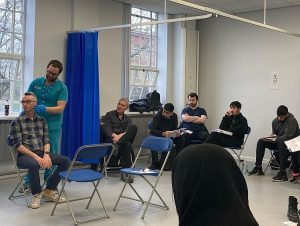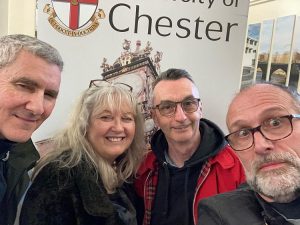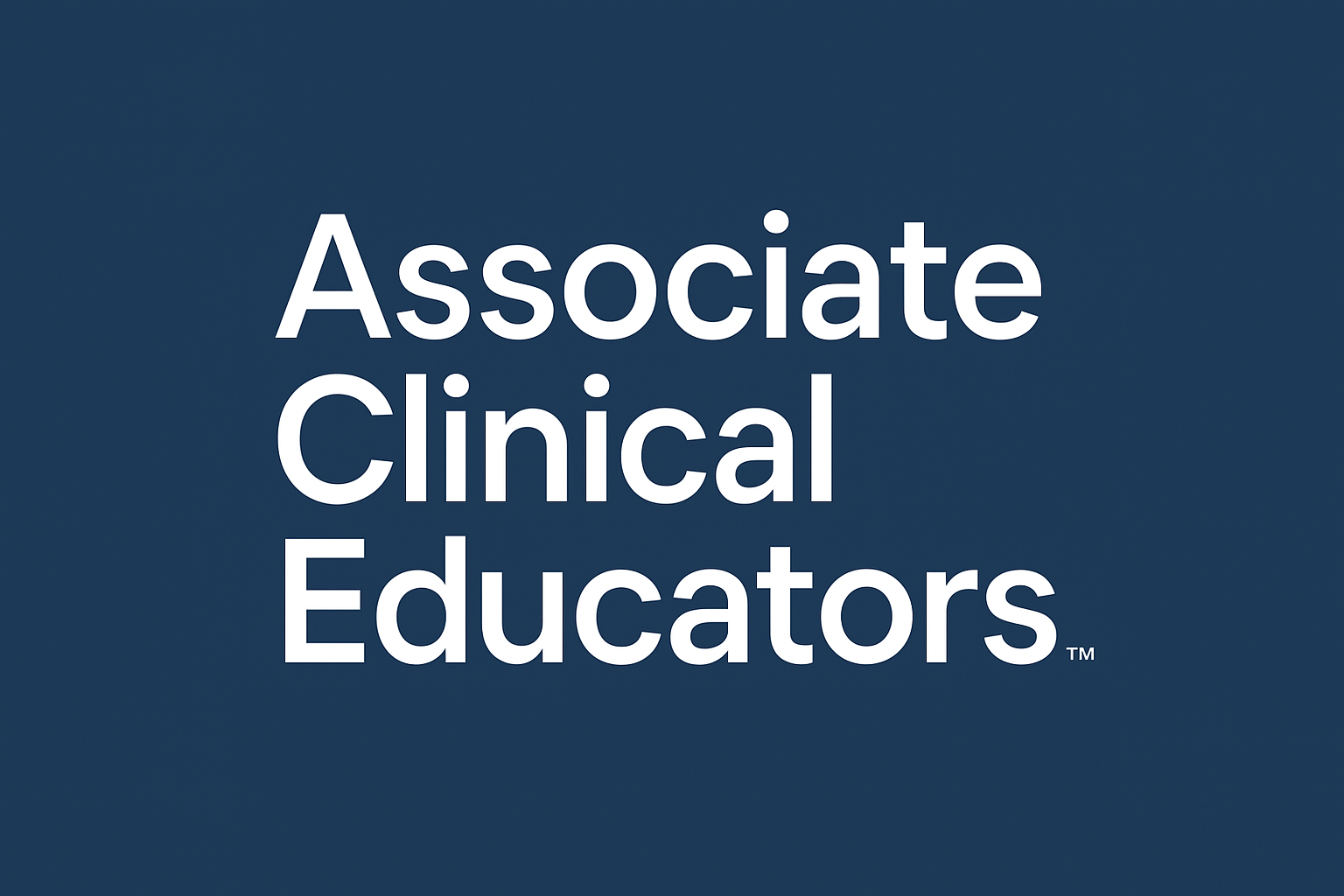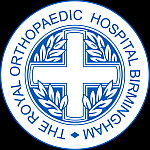The past month has been frantic! Both of our partners (Wolverhampton and Chester University) have kept us busy with both their 1st and 2nd year cohorts. We have sent teams of ACEs out, providing hi-fidelity teaching and simulation covering a number of body systems. The teaching included reviews of both their communication and history taking skills. So far the topics we have covered are Cranial Nerves, Cardio-vascular, Gastro-intestinal, Respiratory and scenario based training.
In the next few weeks we will also be teaching upper and lower limb neurological exams, as well as intimate examinations on males and females. We have access to specially trained ACEs for this type of examination. Obviously when students perform these types of examinations there is often a degree of embarrassment on the part of the student. Our ACEs are highly experienced in allaying any fears the student may have, and this creates a safer and confident approach when examining a real patient. Most medical institutions don’t offer this type of experience to their students and often rely on using mannequins to practice their skills on.
Our connections to other institutions continue to expand and we are currently in talks with a couple of universities who have expressed an interest in what we are doing. We have recently been involved in MMIs for the recruitment of medical students at The University of Chester.
It still amazes me at how adept our ACE™ team can be. They are able to switch systems examinations at a moments notice, improvise around a theme and yet still provide high quality feedback to the academics and clinicians who are teaching on that module. It is experiences like these that have prompted me to write this month’s post. Without wanting to sound repetitive and simply repeating the last post, I think institutions and individuals are starting to realise the difference between an ACE™ and a simulated patient.
In a few weeks you will have the opportunity to listen to Mark and myself talk about the ACE™ role with James Catton from the PA Podcast. He was somewhat surprised at the level of our knowledge of body systems and was under the illusion that we were simply simulated patients and role players. He was so impressed with our expertise that he is in the process of organizing workshops with the University of East Anglia and Anglia Ruskin University Cambridge Campus.
So, coming back to our team of ACEs and their diverse range of skills, let’s look at a typical month of Meducate Academy’s workload.
 In the last month we have worked with students to improve both their clinical and history taking skills. This was done in the context of both OSCE practice and when they are out on placement where they are expected to use a hybrid approach. We also worked with an experienced Physician Associate in a GP Practice, helping them with their time management and trouble shooting skills. This demonstrates how diverse our ACEs can be when required.
In the last month we have worked with students to improve both their clinical and history taking skills. This was done in the context of both OSCE practice and when they are out on placement where they are expected to use a hybrid approach. We also worked with an experienced Physician Associate in a GP Practice, helping them with their time management and trouble shooting skills. This demonstrates how diverse our ACEs can be when required.
Our skills were also required in order to help pharmacists with their clinical examinations. This was for an assessment to help them gain their Independent Prescribing Course qualification. The pharmacists were given the opportunity to practice their examination skills in a safe environment with ACEs who gave feedback on their techniques. Techniques such as percussion, palpation and auscultation. We helped them work through the seven main body systems whilst the clinicians present talked about the common pathologies they would encounter.
Skills such as these can be practiced with a volunteer or even a sim-man, however what the students don’t get is high quality feedback. This is the main strength of our approach to teaching and the key to our success. Knowing the moves is not enough. The clinician must be able to perform these skills correctly and with our help, through educated feedback, become excellent, safe clinicians.
The body systems covered in the past month have included G.I, respiratory, cardio-vascular, cranial nerves as well as a whole range of neurological exams. We also covered history taking scenarios and the practical aspects of examining a diabetes patient, and how to examine the thyroid.
With the 2nd year Physician Associates we were able to guide them with multiple systems reviews working in a hybrid way. Just like the real world of medicine.
 On top of all this of course is the ongoing conversations we have with the students about their fears and worries about the intensity of their course. The students always feel that they can talk to us more openly about their fears rather than going to the academic tutor. This takes some of the pressure off the academics who already have a full timetable. In the 12 years I have been an Associate Clinical Educator I have spent many hours helping students build their confidence and motivation through a variety of strategies.
On top of all this of course is the ongoing conversations we have with the students about their fears and worries about the intensity of their course. The students always feel that they can talk to us more openly about their fears rather than going to the academic tutor. This takes some of the pressure off the academics who already have a full timetable. In the 12 years I have been an Associate Clinical Educator I have spent many hours helping students build their confidence and motivation through a variety of strategies.
Knowing that students will confide in you and seeing them graduate is the most rewarding part of the job and the reason I do this work. It’s a role I would recommend to anyone who enjoys working with the medical profession. It’s our way of giving back to the NHS in a small way.
Also, we have finally organised the accreditation process for the ACE™ role and will be running a pilot of this at the University of Wolverhampton in May 2022 with Professor Jim Parle.
On top of all that, a few weeks ago I was called into Trinity Court GP surgery in Stratford-Upon – Avon to run a workshop to 25 staff about how to deal with conflict in the workplace!
Now that’s diversity.
If you are a Clinical Educator and would like to take advantage of using ACEs as part of your clinical teaching, book now for a free consultation. Contact us via the form below or give us a call on 07870611850. Thanks again for reading this post.




